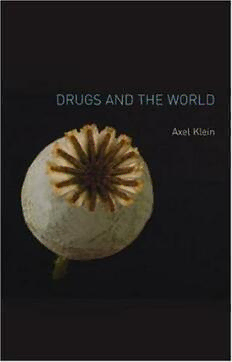
Drugs and the World PDF
Preview Drugs and the World
DRUGS AND THE WORLD Axel Klein DRUGS AND THE WORLD Axel Klein DRUGS AND THE WORLD Axel Klein reaktion books Published by Reaktion Books Ltd 33Great Sutton Street London ec1v 0dx www.reaktionbooks.co.uk Copyright © Axel Klein 2008 All rights reserved No part of this publication may be reproduced, stored in a retrieval system, or transmitted, in any form or by any means, electronic, mechanical, photocopy- ing, recording or otherwise, without the prior permission of the publishers. Printed and bound in Great Britain by Cromwell Press Ltd, Trowbridge, Wiltshire British Library Cataloguing in Publication Data Klein, Axel, 1961- Drugs and the World 1. Drug abuse –Social aspects I. Title 362.2’9 isbn-13: 9 781 86189 381 9 Contents Introduction 7 1 Taking Leave of Our Senses: Drug Use and Drug-taking in the 21st Century 15 2 The Pathology of Drug Use 39 3 Possible Benefits of Drug Use 74 4 How Drugs Have Shaped History in the Modern Era 86 5 Redefining the Issue: Symptom of Decadence or Development Problem? 112 6 International Drug Control: System and Structure 121 7 How Drugs Became a Development Issue 132 8 Drugs and Development Along the Silk Route 152 9 Positives and Negatives of the Drugs Economy 169 10 The Khat Economy 177 11 Drugs and the Management of Pleasure 183 References 197 Select Bibliography 209 Index 217 Introduction Over the past two decades there has been such an increase in publications, research and policy initiatives that it is becoming increasingly possible to make sense of a ‘drugs field’, at least in the uk, parts of Europe and North America. In other parts of the world, too, academics, policy-makers and the wider public are displaying a growing interest in finding out more about what mind-altering substances can do to individuals, families and entire societies. Always a complex issue, research has been advancing so rapidly that the field is fragmenting into sub dis cip - lines and ever narrower specializations. This is apparent from the range of academic journals concerned with the treatment of addiction, education and prevention, or international policy issues, to name but a few examples. Drugs also play an important supporting role in disciplines such as criminology and sociology, and are, of course, of concern to pharmacology, chemistry, law and various branches of medicine and public health. Scholars and public alike have been exposed to relentless media coverage ever since the 1950s. Whether it is concern over new drugs such as ecstasy, crack cocaine or methamphetamine, the repackaging of old drugs such as cannabis in its new guise of ‘skunk’, the titillating indulgences of celebrities, the sinister underworld of organized crime, or the environmental devastation caused by crop eradication, drugs are rarely out of the news. In a medium defined by the present, emphasis is always placed on the immediacy of the problem or the novelty of the threat, but the drug story in all its lurid detail of degradation and debasement has been around for over a century. In keeping with another con- vention of the genre, it is the exceptions –dysfunction, crises and 7 spectacular excess –that are reported, not the vast majority of unproblematic experiences and encounters. This is regrettable as large sections of the public have no direct experience of these ‘drugs’ and rely on the media not just for entertainment but also for information. What allows newspapers to over-report, say, the deaths of young people taking mdmaand under-report aspirin overdoses, is the legal framework and government policy that has declared a range of substances, including mdma, illegal. Governments have been concerned with the regulation of ‘drugs’, and the penaliza - tion of transgressions, for nearly a century. Reluctant at first, the authorities in the ukas elsewhere have now taken on the fight against the drug peril as one of the core functions of government. It is in the us, however, where these efforts have been called ‘a war on drugs’, and have initiated an expansion of the powers and the punitive apparatus of the state that is without parallel in the history of modern democracies. In countries like China, Saudi Arabia, Singapore and Malaysia, where ‘traffickers’ are executed with a chilling regularity, the ‘drug war’ allows for governments to signal their vision of what constitutes a proper society, to under- score what constitutes the authority and the function of the state, and how dissent is dealt with. It is the government then, which in the uk,as in most other countries, drives drug policy with so-called ‘information packs’, public ‘education’ messages aimed particularly at the young, and by funding the police force and prison services, that sets the frame work for what is permissible and what is not. While the media remains free to sensationalize personal tragedies and paint vastly distorted pictures of risk and dangers, it is far more constrained in reporting positive aspects of ‘drugs’ or the relative safety, say of cannabis, in terms of overdose risk. In a policy climate of ‘zero tolerance’ of drug use, politicians are quick to come down on any hint of irresponsible reporting. The media, in turn, scrutinize individual politicians for their personal conduct and governments for their calibre lest they become ‘soft on drugs’. It is against this background of disinformation, alarm and disaffection that much of the recent work on drugs has to be situated. Drug use is a stubbornly persistent social phenomenon in spite of massive campaigning by media and drastic policy by 8
